I've watched too many field service companies struggle with the same frustrating cycle: your team completes jobs, but their reports:
- arrive late
- incomplete, or
- buried in paperwork that someone has to transcribe later.
Meanwhile, you're sitting in the office wondering which jobs are ready to invoice, why your job costing numbers don't add up, and how to stop the constant phone tag between the office and the field.
The real problem is that manual reporting creates a visibility gap between field work and office operations. When job details live on paper scraps or in phone conversations, you lose control over scheduling, billing gets delayed, and profit margins become guesswork.
I've researched the field reporting software market extensively, talking to operations managers who've made the switch from paper-based systems to digital platforms.
In this article, I'll walk you through the best field reporting tools based on three critical factors:
- How well they capture accurate field data in real-time
- Whether they actually automate your invoicing process, and—most importantly
- If your team will actually use them consistently
After my extensive research, these 9 tools stand out:
| Software | Best For | Pricing |
|---|---|---|
| Buildbite | Small-to-mid-sized contractors preventing revenue leakage through client transparency and documentation | Starting at $18 /user /month. |
| Procore | Large construction firms managing complex, multi-year projects requiring comprehensive enterprise solutions | Not publicly available. Contact sales team for a quote. |
| Jobber | Small service businesses handling high-volume, repetitive jobs (e.g., lawn care, plumbing, HVAC) | Starting at $30 per month (Individuals) |
| FieldPulse | Growing field service contractors seeking comprehensive business management with franchise capabilities | Starting at $59 per month (Individuals) |
| Workiz | Scaling field service teams needing intuitive office-to-technician coordination and administrative efficiency | Starting at $187 per month (3 users) |
| Salesforce Field Service | Large enterprises integrating field operations with existing Salesforce CRM and customer data | Starting at $55 /user /month. Annual billing. |
| eSUB | Medium-to-large subcontractors in specialized trades requiring rigorous document control and accountability | Starting at $39 /user /month. |
| FieldWire | Growing construction teams bridging jobsite-to-office communication with scalable blueprint management tools | Starting at $39 /user /month. |
| ServiceTrade | Commercial service contractors needing compliance management, inspections, and revenue growth tools | Not publicly available. Contact sales team for a quote. |
1. Buildbite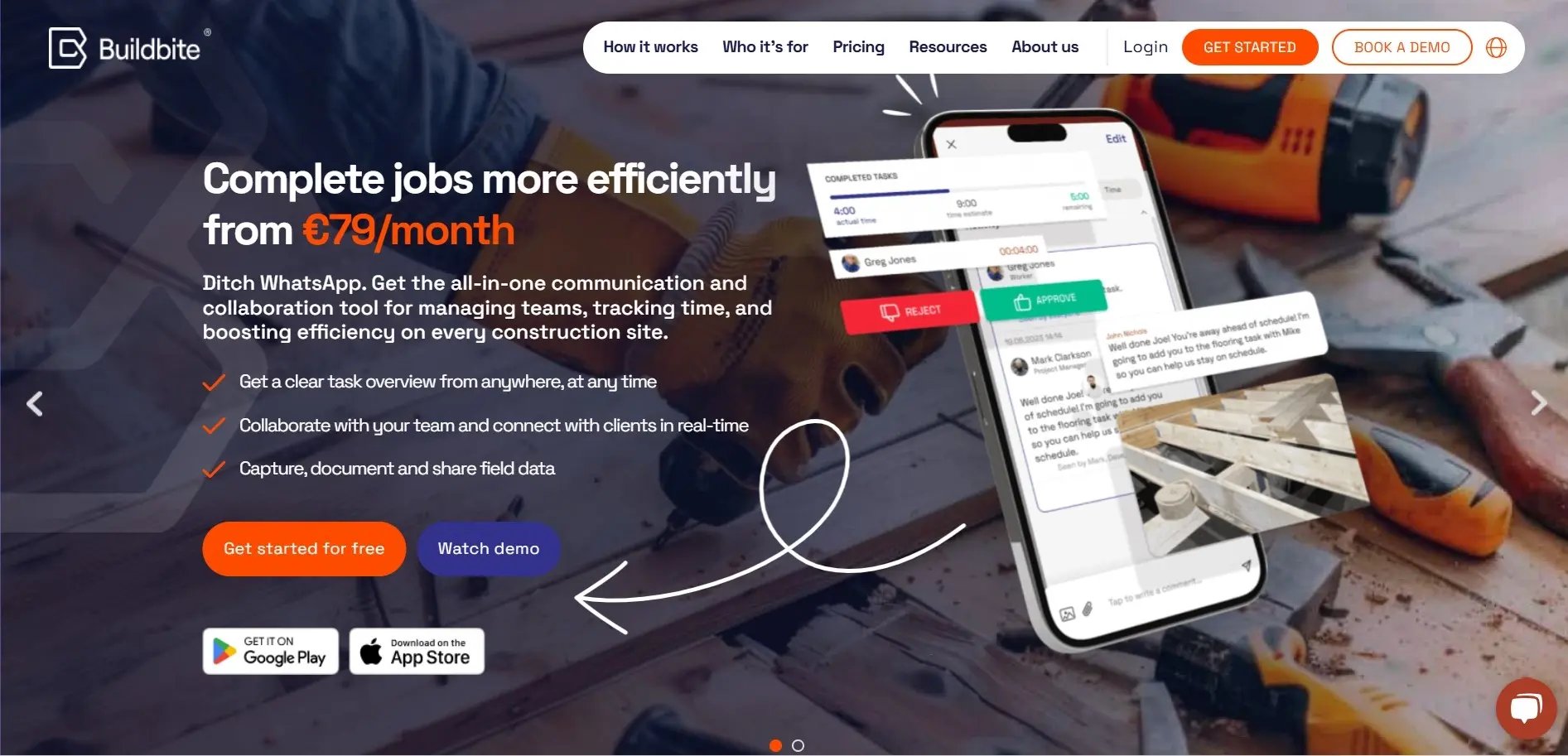
Buildbite is a field management app that centralizes site documentation, team communication, and client approvals in a single mobile-first app. It turns fragmented field data into actionable information so that:
- Managers make faster decisions
- Field teams spend less time on admin, and
- Customers see transparent progress through real-time updates and authenticated approvals
Here’s how Buildbite’s mobile-first app keeps your operations in check:
Complete Project Oversight with Real-Time Task and Time Management
Buildbite's centralized dashboard gives managers complete visibility across all job sites, while field crews get their own auto-filtered "My Tasks" view filtered by date (yesterday, today, tomorrow).
The result? Project bottlenecks get spotted before they derail timelines, and field teams know exactly what to and when.
- Time tracking becomes effortless with one-tap clocking that captures accurate labor data tied to specific tasks.
- This data feeds directly into precise job costing and resource forecasting—no more guessing where your budget went.
- A built-in approval workflow means workers submit tasks for instant approval with photos and comments, eliminating any back-and-forth that typically slows projects down.
Bulletproof Documentation That Prevents Disputes and Unbilled Work
Unbilled work destroys profit margins. Here's how Buildbite plugs those revenue leaks:
- Authenticated change orders: Every scope change becomes billable evidence with timestamps and approvals—no more disputes over "when did we agree to this?"
- Centralized project archive: Documents, approvals, and photos stored in one searchable place—pull exact proof in seconds when billing questions surface months later
- Context-linked client approvals: Clients approve changes and comment on the exact task or photo, shrinking email threads from days to minutes

Connect Field, Office, and Clients in One Unified Communication Hub
Forget juggling WhatsApp, email, and phone calls. Buildbite's multi-chat system keeps everything organized:
- Workspace chat for company-wide discussions
- Project-specific conversations that keep job details separate
- Client-facing chats that keep customers actively involved in project discussions

Clients gain real-time project transparency at no extra cost—they can view live updates, track approvals, and authorize changes directly in the app. This transparent communication eliminates misaligned expectations while capturing every change request in writing, increasing both billing accuracy and client satisfaction.
Get Your Team Using It from Day One (Mobile-First Onboarding That Actually Sticks)
Most field reporting apps fail because they're desktop software crammed onto phones. Buildbite's mobile-first UI is built for jobsite reality—designed for phones and tablets from the ground up.
Rapid onboarding gets you operational fast:
- Launch your first job in ~60 seconds
- Experiment in a pre-loaded demo job
- Learn by doing with in-app coach marks and tooltips (no thick manuals)

Simple feature set focuses on essentials with less clutter for faster adoption. Easy SMS/email invites auto-add people to workspaces, eliminating setup friction.
Even skilled craftsmen unfamiliar with apps start documenting daily work immediately—because it actually works the way they work.
Simplify your field work with Buildbite
See how a simple mobile app unifies job tracking, chat, and documentation to improve productivity and protect your margins.
Buildbite Pros
- Prevents revenue leakage immediately - Users report 95% billing rates almost instantly because every detail gets documented automatically, eliminating unbilled work
- Drives adoption across all skill levels - Even craftsmen unfamiliar with apps begin daily documentation thanks to single-tap actions and intuitive workflows
- Cuts project management overhead dramatically - Managers save 2.5 hours per person daily by eliminating manual checkups, reporting, and administrative tasks
- Transforms client relationships - Real-time transparency and authenticated approvals reduce disputes while building trust through verified progress visibility
- Scales documentation without extra effort - Field teams capture 100% more photos and videos within weeks through a simple mobile interface
Buildbite Limitations
- Not aimed at mega-enterprise GC programs; best fit is small to mid-sized field teams.
- Lean by design; if you need deep ERP-style configurability, you may prefer heavier platforms.
Buildbite Pricing
Buildbite has three transparent pricing packages, with no hidden costs or additional fees:
| Plan | Monthly Cost | Annual Cost (per month) | Annual Savings | Users | Data Storage |
|---|---|---|---|---|---|
| Basic | $129 | $89 | 31% | Up to 5 | 1GB |
| Standard | $199 | $139 | 30% | Up to 20 | 3GB |
| Premium | $279 | $199 | 29% | Up to 50 | 7GB |
Cost savings up to 31% by opting for Buildbite’s annual subscription plans.
Buildbite offers a free 14-day trial on all packages with full access to all features, allowing you to experience firsthand how the app simplifies communication, coordination, and centralized management across your projects.
Buildbite Reviews
"With Buildbite we build great customer relationships and we've increased our billing rate to 95%"
— Thomas Norelia, CEO, Trähus
Simplify your field work with Buildbite
See how a simple mobile app unifies job tracking, chat, and documentation to improve productivity and protect your margins.
2. Procore
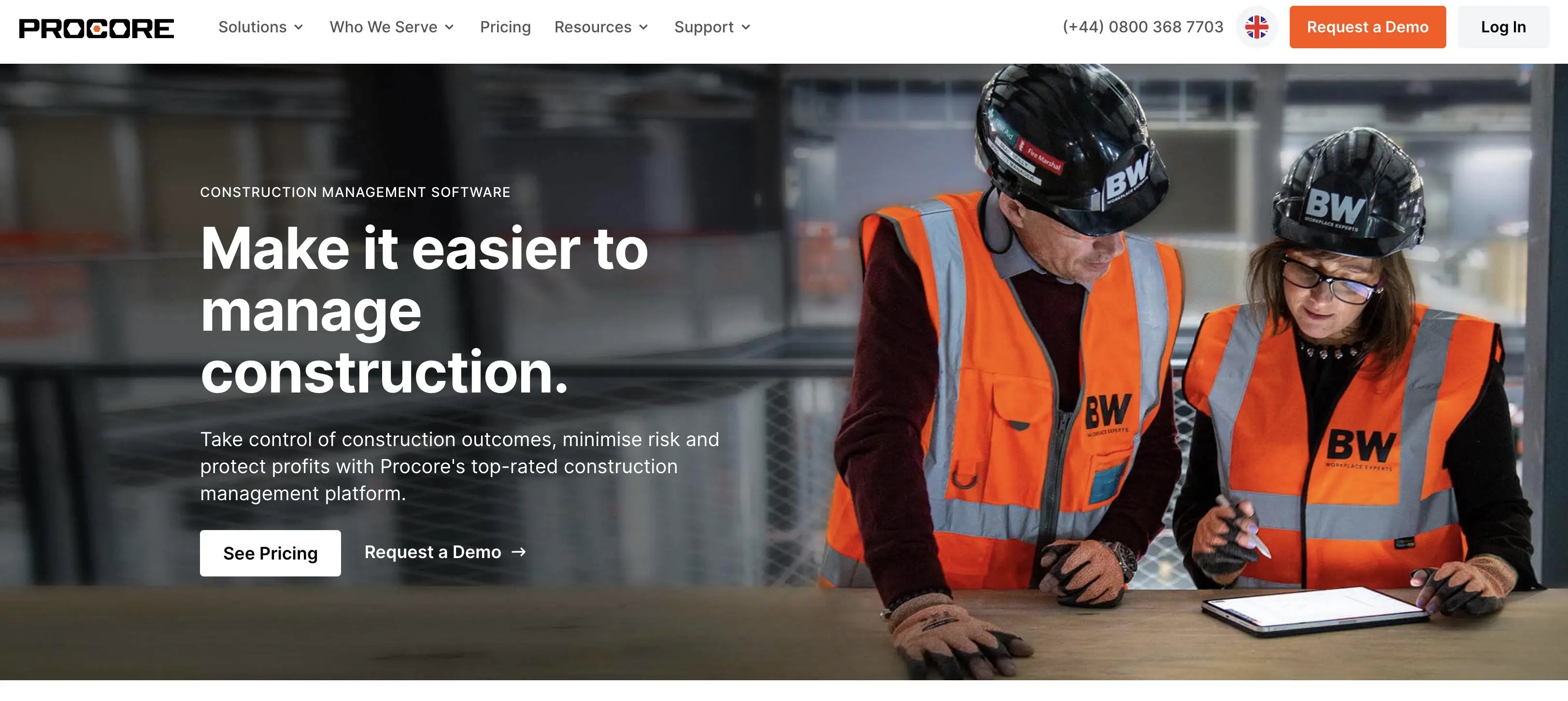
Procore serves as the enterprise standard for comprehensive construction management, positioning itself as an all-in-one cloud-based platform that consolidates project management, financial tracking, quality assurance, and resource planning into a single integrated ecosystem.
Designed for medium to large companies handling complex, high-value projects, Procore connects teams, documents, and project information in a centralized location with unlimited user access.
Procore Key Features
-
Comprehensive document and site management - Centralized database with versioning, markups, and timestamped audit trails
-
Extensive integration ecosystem - Seamless connections with QuickBooks, Sage, Xero, AutoCAD, and Revit for data flow
-
Mobile field collaboration - Real-time project updates and stakeholder communication without additional licensing costs
-
Construction accounting integration - Connects project data directly with financial systems to reduce manual data entry
Procore Pros
-
All-in-one platform eliminates software fragmentation - Single system manages entire project lifecycle from bidding to closeout
-
Unlimited users included - No per-seat licensing allows large organizations to onboard entire teams without cost scaling
-
Robust financial management - Integrated accounting connections reduce errors and duplicate data entry across systems
-
Enterprise-grade scalability - Handles multi-billion dollar projects and thousands of users within unified workflows
Procore Limitations
-
Volume-based pricing creates high costs - Annual fees of 0.1-0.2% of project value can reach $80,000+ for large projects
-
Steep learning curve - Complex feature set requires significant training investment, especially for less tech-savvy users
-
Mobile app functionality gaps - Limited capabilities for managing submittals and RFIs from mobile devices
-
Annual contracts with price increases - Reported 2-10% annual price hikes during renewal periods, adding long-term cost pressure
Procore Pricing
Procore uses an opaque volume-based pricing model calculated as a percentage (0.1-0.2%) of Annual Construction Volume rather than per-user fees.
Companies must request custom quotes. Users report typical costs ranging from $20,000 annually for $15 million projects to $80,000 for $59 million projects. This pricing structure intentionally targets large enterprises while creating barriers for smaller firms.
Procore Reviews
Procore receives good user ratings:
-
G2: 4.6/ 5 (based on 3.557 reviews)
-
Capterra: 4.5/ 5 (based on 2710 reviews)
With users praising its comprehensive feature set, document management capabilities, and accounting integrations. However, the primary complaint focuses on high costs that can "erase a job's profit" for smaller contractors, along with requests for more user-friendly dashboards and reporting interfaces.
3. Jobber
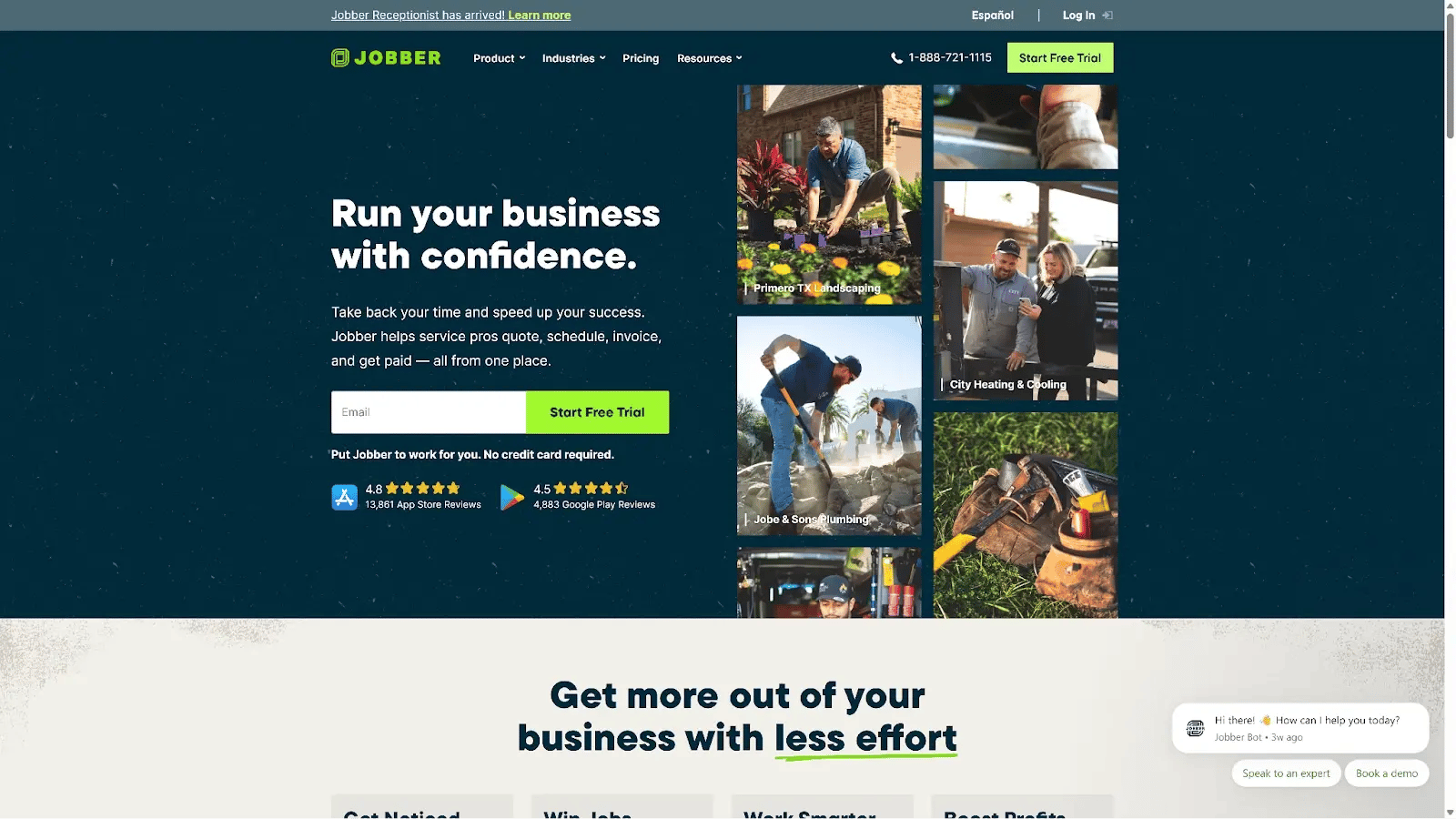
Jobber positions itself as the all-in-one solution for small to medium-sized home service businesses, serving over 50 different industries.
It functions as a central hub that consolidates your entire service process—from initial client contact through final payment—eliminating the paper-based workflows that drain productivity and create billing delays.
Jobber Key Features
- AI-powered tools suite including Hey Jobber (voice control), Jobber Copilot (business coach), and AI Receptionist for 24/7 call answering
- Integrated online booking and professional quotes that convert leads without manual intervention
- Real-time expense tracking and financial performance analytics connected to QuickBooks integration
- Complete job scheduling, dispatching, and invoicing workflow in a single platform
Jobber Pros
- Intuitive interface with no CRM experience required - users can start managing jobs immediately without extensive training
- Dedicated onboarding support and consistently responsive customer service that provides knowledgeable assistance when issues arise
- Proven revenue impact with users reporting 44% average growth in their first year of implementation
- Eliminates administrative overhead by automating paper-based processes, saving hours of manual work weekly
Jobber Limitations
- Frequent platform updates require relearning workflows - long-time users report frustration with constant interface changes
- AI troubleshooting interface creates friction when users need quick problem resolution
- Learning curve exists for CRM newcomers despite the user-friendly design
Jobber Pricing
Jobber offers transparent tiered pricing with Core, Connect, and Grow plans designed to scale with business growth. A free trial allows you to test functionality before committing. Pricing scales based on user count and feature requirements.
| Plan Type | Tier | Price | Notes |
|---|---|---|---|
| Individuals | Core | $30/month | |
| Individuals | Connect | $90/month | |
| Individuals | Grow | $150/month | |
| Teams | Connect | $127/month | Up to 5 users |
| Teams | Grow | $262/month | Up to 10 users |
| Teams | Plus | $450/month | Up to 15 users |
| Trial | – | 14-day free trial | Available on all plans |
Jobber Reviews
Jobber maintains strong ratings:
-
G2: 4.6/ 5 (based on 402 reviews)
-
Capterra: 4.6/ 5 (based on 1199 reviews)
Users are consistently praising its comprehensive functionality and user-friendly design. Reviews highlight the balance between powerful features and accessibility for non-technical users.
Looking to compare Jobber with other solutions? Check out our blog on Jobber alternatives.
4. FieldPulse
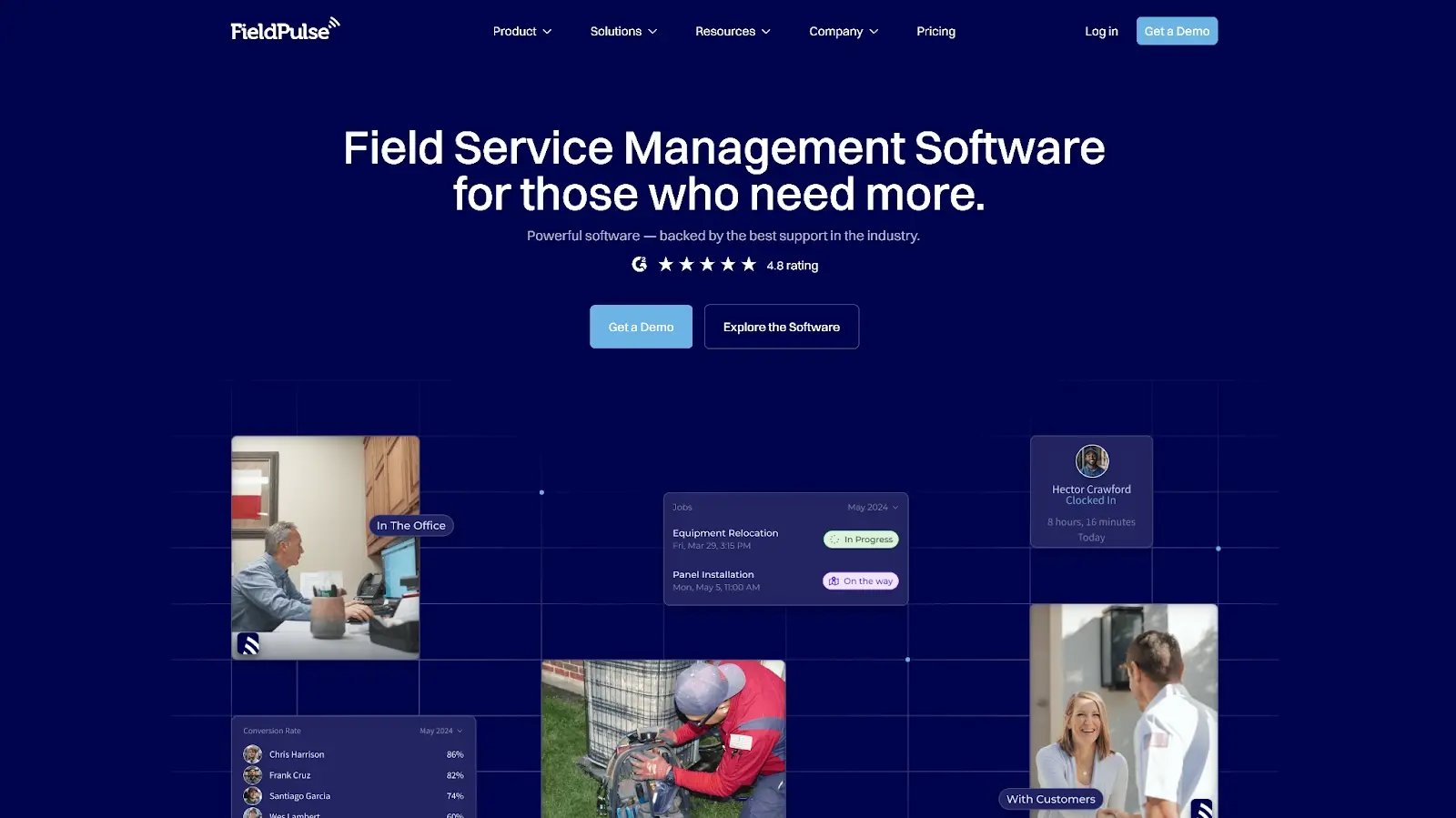
FieldPulse markets itself as the support-driven FSM solution, emphasizing unmatched customer service alongside customizable workflows. It targets field service teams that need flexibility to adapt the software to their unique processes rather than forcing their operations to fit rigid software constraints.
FieldPulse Key Features
- Customizable workflows and business process adaptation that molds to your existing operations
- Complete FSM suite including scheduling, dispatch, estimates, invoices, and integrated CRM
- Advanced reporting functionality for tracking business performance and key metrics
- Fast customer support response times with personalized assistance
FieldPulse Pros
- Exceptional customer service with rapid response times - users consistently highlight personalized, knowledgeable support
- High flexibility allows workflow customization to match specific business processes without forcing changes
- Impressive growth metrics with 78% average annual revenue increase and 84% productivity improvement reported
- Easy setup process that gets teams operational quickly
FieldPulse Limitations
- Reporting capabilities don't match sales promises - users report significant gaps between marketed KPIs/dashboards and actual functionality
- Technical glitches with add-on services including phone number services that fail to connect calls properly
- Feature gaps between marketing claims and delivered functionality create frustration during implementation
FieldPulse Pricing
FieldPulse uses per-team tiers with annual discounts.
Public pricing:
| Plan | Price (Monthly) | Price (Annually) | Best For |
|---|---|---|---|
| Basic | $79/month | $59/month | Solo pros |
| Essentials | $189/month | $149/month | Growing teams |
| Professional / Enterprise | Custom pricing | Request Quote | Advanced users |
Additional paid add-ons (Fleet Tracking, Sales Suite, PDF form tools) are available. Exact costs depend on users and selected add-ons.
FieldPulse Reviews
-
G2: 4.7/ 5 (based on 344 reviews)
-
Capterra: 4.6/ 5 (based on 296 reviews)
Users are frequently commending support quality and flexibility. However, negative reviews specifically mention reporting disappointments, suggesting thorough demo evaluation is essential.
5. Workiz
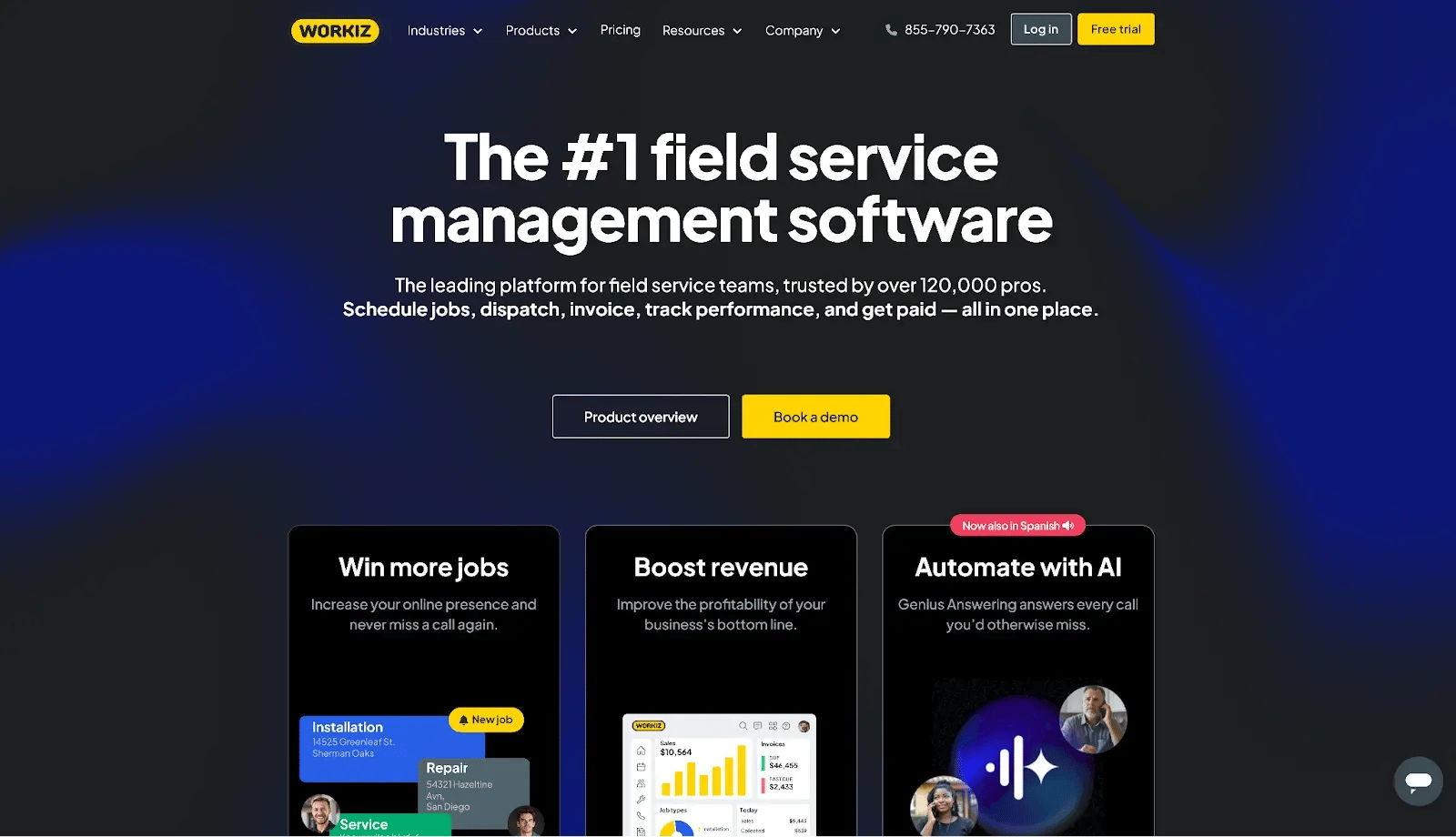
Workiz positions itself as the intuitive, payment-focused FSM platform designed for field professionals rather than IT departments.
It emphasizes built-in payment processing, AI-powered automation, and a user interface that technicians can navigate without extensive training, making it particularly attractive for businesses prioritizing ease of adoption.
Workiz Key Features
- Integrated payment processing with online payments, card readers, and pre-deposit options for estimates
- AI-powered automation suite including Workiz Genius and Genius Answering for call handling and dispatching
- Built-in phone system that eliminates the need for separate communication tools
- Drag-and-drop schedule with GPS tracking for streamlined dispatch operations
Workiz Pros
- User-friendly interface designed for field workers - built for technicians, not IT specialists, ensuring high adoption rates
- Comprehensive integrated payments and communications eliminate the need to switch between multiple apps during job completion
- AI automation reduces administrative busywork by handling routine tasks like booking and dispatching
- All-in-one functionality keeps teams focused on fieldwork instead of app management
Workiz Limitations
- Contradictory customer support experiences - reviews split between praising excellence and citing unresponsiveness
- Expensive pricing with hidden fees that increase rapidly as team size grows beyond initial users
- Limited customization options for reports and workflows compared to competitors
- Free plan severely restricted - meaningful functionality requires paid plans
Workiz Pricing
Workiz offers a free plan for up to two users but is considered expensive as businesses scale. Users report frustration with costs that escalate quickly when adding team members, plus unexpected fees not clearly disclosed upfront.
Public pricing:
| Plan | Monthly Price (Incl. Users) | Annual Price (Incl. Users) |
|---|---|---|
| Lite | Free (up to 2 members) | Free (up to 2 members) |
| Kickstart | $225/month (3 users) | $187/month (3 users) |
| Standard | $275/month (5 users) | $229/month (5 users) |
| Pro | $325/month (5 users) | $270/month (5 users) |
| Ultimate | Contact for pricing | Contact for pricing |
Workiz Reviews
-
G2: 4.6/ 5 (based on 179 reviews)
-
Capterra: 4.4/ 5 (based on 213 reviews)
Reviews reveal significant dissatisfaction with pricing transparency and inconsistent support quality. The platform's functionality is generally praised, but financial concerns dominate negative feedback.
6. Salesforce Field Service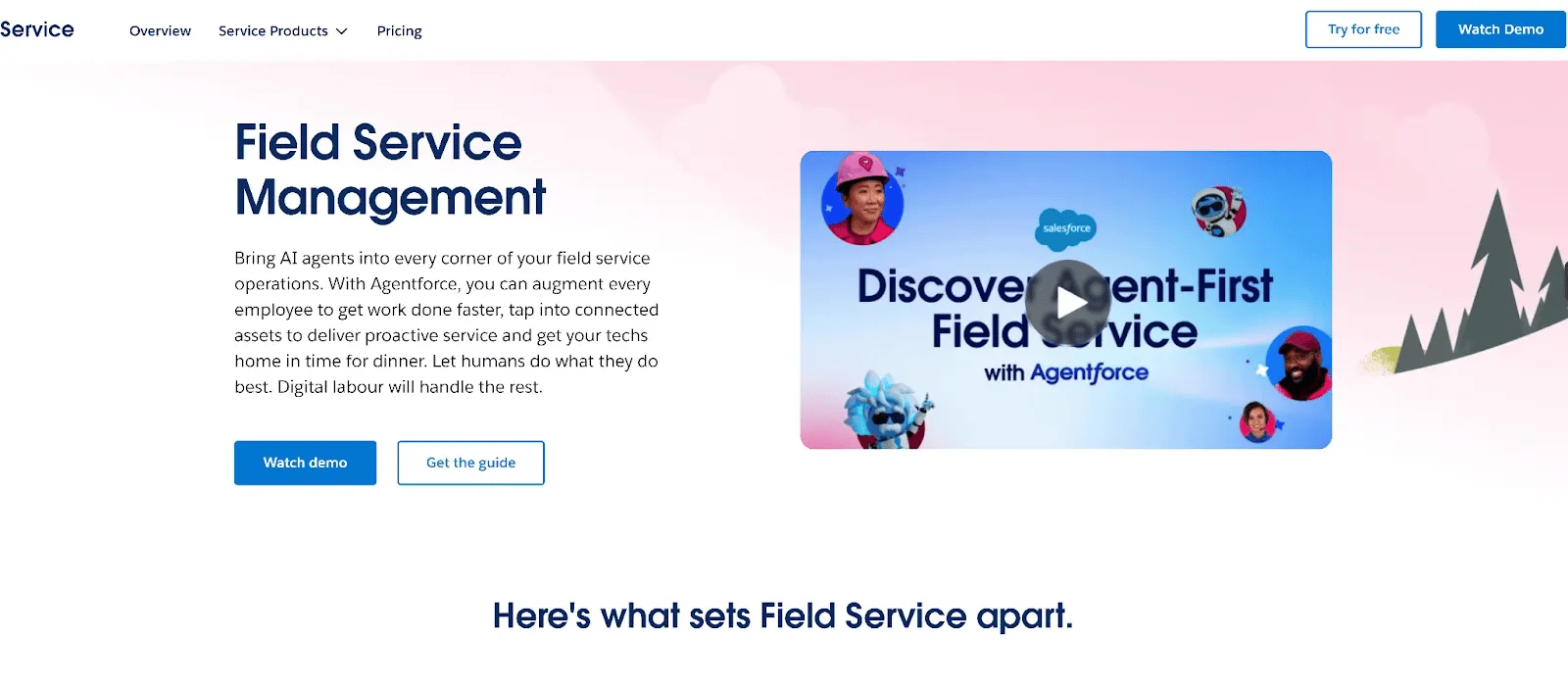
Salesforce Field Service operates as part of the broader Salesforce ecosystem, targeting businesses that already use or plan to implement Salesforce products.
It's designed for organizations needing enterprise-grade customization and deep CRM integration, making it most suitable for companies with dedicated IT resources and complex operational requirements.
Salesforce Field Service Key Features
- AI-driven scheduling optimization that automatically assigns technicians based on skills, location, and availability
- Deep Salesforce CRM integration providing complete customer journey visibility for field and office teams
- Real-time location tracking and work order management with mobile accessibility
- High customization capabilities to match specific business processes and industry requirements
Salesforce Field Service Pros
- Seamless integration with Salesforce ecosystem allows real-time connection between field data and customer records
- Advanced AI features for scheduling and service automation improve efficiency and customer satisfaction scores
- Enterprise-level customization adapts to complex business requirements that generic solutions can't handle
- Comprehensive data integration provides holistic customer view across all touchpoints
Salesforce Field Service Limitations
- Complex implementation requiring significant technical expertise - setup and training demand substantial IT investment
- Mobile app customization limitations frustrate field workers who need robust, flexible tools
- Enterprise-grade pricing with hundreds of dollars per user monthly makes it cost-prohibitive for smaller teams
- Steep learning curve that can overwhelm teams without dedicated technical support
Salesforce Field Service Pricing
Pricing follows tiered, annual billing with separate plans for technicians and agents. Costs are substantial, typically hundreds of dollars per user per month, positioning it as an enterprise investment rather than a small business solution.
Public pricing:
| Plan | Price (€ / user / month) | Use Case |
|---|---|---|
| Dispatcher | $175 (billed annually) | AI-powered scheduling, route optimisation, and real-time field visibility |
| Technician | $175 (billed annually) | Mobile-first field productivity (offline updates, quotes, payments) |
| Contractor | $55 / user or $22 / login (billed annually) | Manage extended workforce with secure access to jobs and reporting |
| Contractor Plus | $80 / user or $32 / login (billed annually) | Revenue generation and performance tracking for contractors |
| Field Service Plus | $230 (billed annually) | Unified selling + service suite combining Dispatcher, Technician & Salesforce Clouds |
| Agentforce 1 Field Service | $650 (billed annually) | Complete AI-powered platform with assistants, analytics, and credits |
Salesforce Field Service Reviews
-
G2: 4.4/ 5 (based on 693 reviews)
-
Capterra: 4.2/ 5 (based on 31 reviews)
Users who value integration and customization power. However, reviews consistently mention implementation difficulty and mobile app limitations as significant drawbacks for field-focused operations.
7. eSUB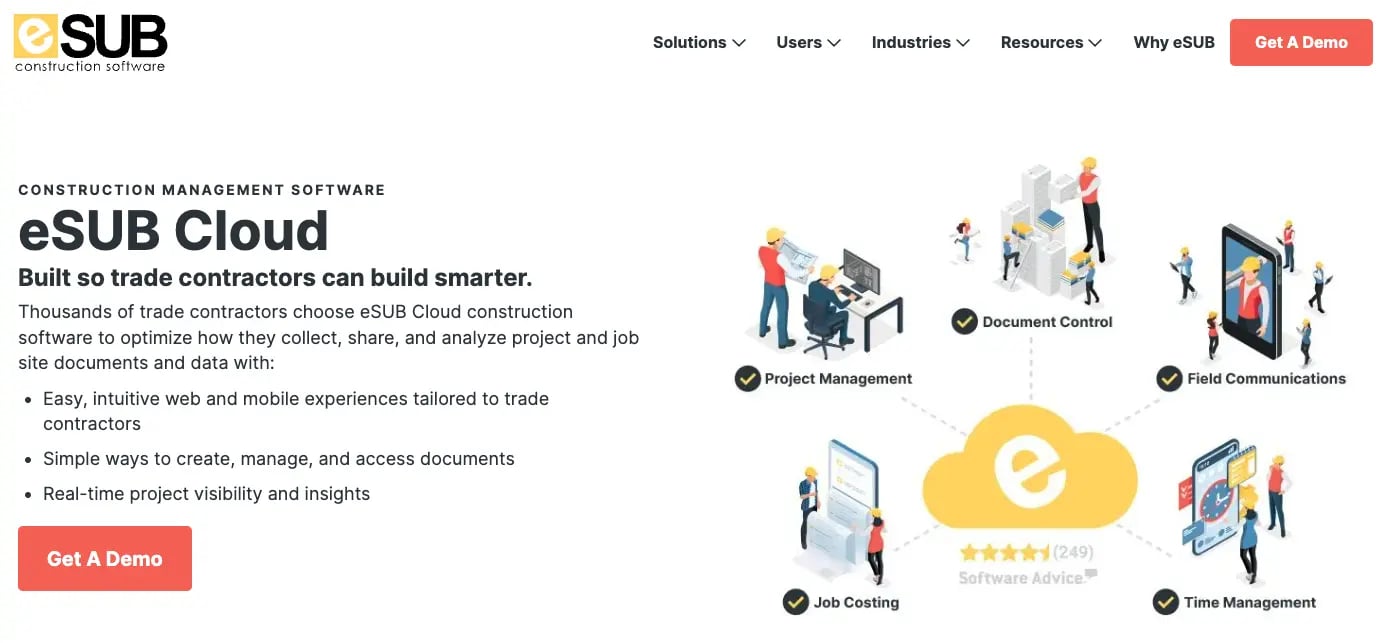
eSUB is construction project management software specifically engineered for medium to large-sized subcontractors in electrical, plumbing, HVAC, drywall, and steel trades.
Unlike generic construction platforms, eSUB focuses exclusively on subcontractor workflows, delivering specialized tools for labor management, document control, and field communications that address the unique operational challenges faced by trade professionals in managing project delivery activities.
eSUB Key Features
- Real-time crew time tracking with GPS - Automatically generates timesheets for streamlined payroll processing
- Comprehensive document management - Creates, emails, tracks, and stores RFIs, change orders, submittals, and purchase orders
- Mobile field reporting - Captures field notes, daily reports, photos, videos, and voice notes directly from jobsites
- Submittal tracking system - Manages approval workflows and correspondence with general contractors
eSUB Pros
- Subcontractor-specific functionality - Purpose-built features address trade-specific needs like submittal management and crew tracking
- Centralized project records - Consolidates all project documentation, reducing scattered paperwork and improving organization
- GPS-enabled time tracking - Eliminates manual timesheet errors while providing accurate labor cost data for payroll
- Voice note capability - Allows field workers to quickly document observations without typing on mobile devices
eSUB Limitations
- No drawing management capabilities - Cannot upload or manage construction drawings, forcing teams to use separate applications
- Persistent technical issues - Users report slow loading times, navigation problems, and duplicated reports that hinder productivity
- Limited integrations - Charges separate fees for accounting software connections, adding hidden costs to implementation
- Clunky interface design - Outdated user interface creates frustration and reduces adoption among field teams
eSUB Pricing
eSub has two price packages, the base and the advanced.
- The base package starts at $39 per user monthly,
- The advanced package starts at $59 per user monthly.
eSUB Reviews
- G2: 4.0 / 5 (based on 66 reviews)
- Capterra: 4.4 / 5 (based on 246 reviews)
Users praise eSUB's document management effectiveness and submittal tracking capabilities, particularly appreciating the centralized approach to project records and cost tracking.
However, consistent complaints focus on technical performance issues, including slow loading speeds, navigation difficulties, and the critical absence of drawing management functionality that fragments workflows.
8. Fieldwire-webp.webp?width=2320&height=1100&name=fieldwire%20homepage%20(1)-webp.webp)
Fieldwire positions itself as a field-first construction management platform designed specifically for on-site productivity and jobsite efficiency.
Rather than prioritizing back-office functions, Fieldwire focuses on automating project and task management for field crews and project managers who spend most of their time on construction sites where intuitive mobile access and offline functionality are critical for daily operations.
Fieldwire Key Features
- Optical Character Recognition (OCR) - Automatically labels page names, detail callouts, and links on uploaded plans
- Robust offline mode - Stores project data locally, enabling plan access and task updates without internet connectivity
- Drag-and-drop task management - Reorganizes deadlines across Kanban boards, Gantt charts, and calendar views
- Mobile plan annotation - Allows field teams to edit prints and attach photos/videos directly onto drawings
Fieldwire Pros
- Intuitive mobile-first design - Field teams can quickly pull up sheets, mark progress, and update tasks without extensive training
- True offline functionality - Works seamlessly on jobsites with poor connectivity, storing data locally until sync is possible
- Free entry point - Basic plan supports up to 5 users and 3 projects at no cost, enabling risk-free testing
- Excellent plan management - OCR technology eliminates manual labeling while maintaining accurate version control
Fieldwire Limitations
- Essential features gated behind expensive plans - RFIs, change orders, and budget tracking only available in the highest-priced Business Plus tier
- No financial management capabilities - Lacks cost tracking, estimating, or accounting features, requiring separate software solutions
- Limited customization options - Restrictive for companies with complex workflows compared to more comprehensive platforms
- Minor mobile app glitches - Some users report issues with plan behavior and photo rotation functionality
Fieldwire Pricing
Fieldwire offers transparent per-user monthly pricing with annual billing discounts. Plans range from free (5 users, 3 projects) to $89 per user per month for the Business Plus plan when billed annually.
The Pro plan starts at $39 per user per month, but critical construction features like RFIs and change orders require upgrading to the most expensive tier.
Public pricing:
| Plan | Annual Price (per user / month) | Monthly Price (per user / month) | Use Case / Description |
|---|---|---|---|
| Basic | Free | Free | For small teams trying out core features (plan viewing, task management, files & photos, checklists) |
| Pro | $39 | $54 | For growing teams scaling with reports, exports, sheet compare, and custom task statuses |
| Business | $59 | $74 | For advanced teams unifying processes with custom forms, integrations, and BIM viewer |
| Business Plus | $89 | $104 | For teams connecting Fieldwire to core tech with RFIs & more |
Fieldwire Reviews
- G2: 4.5 / 5 (based on 366 reviews)
- Capterra: 4.6 / 5 (based on 88 reviews)
Often praised for its ease of use, intuitive interface, and powerful mobile capabilities. The offline functionality and plan viewing efficiency receive particular praise, though users note the strategic limitation of placing essential construction management features exclusively in the highest-priced plan.
9. ServiceTrade

ServiceTrade specializes exclusively in commercial, industrial, and fire safety contractors, offering industry-specific features that generalist FSM platforms can't match.
It's purpose-built for businesses managing compliance requirements, asset tracking, and complex project workflows that require specialized tools rather than one-size-fits-all solutions.
ServiceTrade Key Features
- Industry-specific compliance management, including NFPA fire inspections and regulatory reporting
- Asset tracking and project management designed for commercial and industrial service requirements
- Branded customer portal with Service Links for after-service reports and client communication
- AI-powered scheduling and quoting to streamline complex commercial job management
ServiceTrade Pros
- Specialized industry features provide tailored functionality that generic platforms lack for commercial contractors
- Intuitive drag-and-drop dispatch board earned "Best Ease of Use" recognition from Capterra
- Strong customer-facing communication tools build client loyalty through transparency and professional reporting
- Purpose-built for commercial complexity, handles regulatory requirements and asset management seamlessly
ServiceTrade Limitations
- Limited customization options compared to more flexible platforms
- Few third-party integrations restrict connectivity with existing business tools
- No offline access capability creates problems for technicians working in remote locations without internet
- Opaque pricing requiring sales calls prevents easy cost comparison with alternatives
ServiceTrade Pricing
Pricing information isn't publicly available and requires sales consultation for custom quotes. No free plan is offered, and reviews suggest costs are positioned at the higher end of the market for specialized functionality.
Public pricing:
| Plan | Best For | Users Included | Price |
|---|---|---|---|
| Select | Improve service operations | Starts at 5 techs, unlimited office users | Not publicly available. Contact sales team |
| Premium | Grow your service business | Best for 10–20 techs, unlimited office users | Not publicly available. Contact sales team |
| Enterprise | Build a premium brand | Best for 20+ techs, unlimited office users | Not publicly available. Contact sales team |
ServiceTrade Reviews
- G2: 4.5 / 5 (based on 56 reviews)
- Capterra: 4.6 / 5 (based on 344 reviews)
Ratings reflect its effectiveness within its commercial contractor niche. Users appreciate the industry-specific tools but note limitations in flexibility and integration capabilities compared to broader FSM platforms.
Frequently Asked Questions around Field Reporting
What are the benefits of simplifying data collection with field reporting software?
Field reporting software eliminates the costly "visibility gap" between field work and back-office operations by replacing manual, paper-based processes with automated digital workflows.
The immediate impact is dramatic: platforms like Buildbite save field teams 2.5 hours per person daily by removing manual check-ins and transcription work, redirecting that time toward revenue-generating activities.
Most importantly, digital solutions plug critical revenue leaks. Manual reporting often results in "unbilled work" that directly damages profit margins. Buildbite users increase their billing rates to 95% almost instantly because every project detail gets automatically documented with timestamps and client approvals.
This authenticated documentation transforms scope changes into indisputable, billable evidence.
Even more valuable is the real-time visibility that enables proactive management. Instead of playing phone tag to determine job status, managers receive live project feeds with completion updates and automated threshold alerts when tasks run long.
This allows resource reallocation before budget damage occurs, shifting operations from reactive crisis management to predictive optimization that protects both profitability and client relationships.
What key features should field reporting software include?
Essential field reporting software requires a mobile-first design built specifically for jobsite reality, not desktop programs awkwardly ported to phones.
The field service management platform must include robust offline functionality so crews can access plans and update tasks even without internet connectivity, ensuring continuous productivity regardless of location.
Are you running a smaller construction company looking to go digital? Check out our blog on the best construction mobile apps.
Authenticated documentation capabilities are non-negotiable. Field teams need to capture photo documentation, videos, and signatures directly from job sites with automatic timestamps and contextual notes.
This transforms simple observations into irrefutable evidence for billing disputes and quality assurance, protecting revenue and building client trust.
Most importantly, the software should offer intelligent automation that reduces administrative overhead. Automated invoicing pulls directly from field data, speeding up payment cycles while reducing accounting workloads. AI-driven scheduling optimizes technician assignments based on skills, location, and availability, maximizing operational efficiency.
The platform must integrate seamlessly with existing financial systems like QuickBooks and Sage to avoid creating new data silos. Without proper integration, even powerful features become isolated tools that fragment workflows rather than streamline them, undermining the core goal of unified operations.
What is the most user-friendly field reporting software for non-technical field staff?
Buildbite stands out as the benchmark for user-friendliness among non-technical field staff because it prioritizes rapid adoption over complex functionality. The platform enables users to "launch their first job in ~60 seconds" through its intentionally lean design that eliminates visual clutter and confusion.
The key differentiator is Buildbite's onboarding approach. Instead of overwhelming users with thick manuals, it includes pre-loaded demo jobs for risk-free experimentation and in-app guides that teach users as they work. This ensures skilled craftsmen with limited app experience can immediately start documenting daily work without technical barriers.
Jobber and Workiz also excel in user-friendliness. Jobber requires no prior CRM experience and streamlines the entire service process from initial client contact to final payment through intuitive navigation. Workiz positions itself as "built for field pros, not IT people," offering clean interfaces with easy-to-learn features.
The critical insight is that ease of use for the least technical user determines ROI success. Even the most feature-rich platform becomes worthless if field staff refuse to use it consistently due to complexity. Prioritizing genuine adoption from day one ensures the investment actually delivers measurable returns rather than sitting unused.
5 Steps to choose the best field reporting software for your needs
Step 1: Diagnose Pain Points with Dollar Values Don't list vague problems like "need better organization." Instead, quantify specific losses: how much time and money disappear monthly from manually transcribing work orders or unbilled change orders. This transforms subjective frustrations into measurable financial targets that guide ROI expectations.
Step 2: Create a Requirements Matrix List "must-have" features that directly address your quantified pain points versus "nice-to-have" additions. Include industry-specific needs—subcontractors might require rigorous document control like eSUB offers, while commercial contractors need compliance management features found in ServiceTrade.
Step 3: Test Real-World Usability Involve actual field technicians in evaluation through free trials and pilot implementations with small employee groups. Their hands-on feedback validates whether the mobile-first design and interface will drive consistent adoption across your team's skill levels.
Step 4: Assess Scalability and Integration Select solutions that grow with your business and integrate seamlessly with existing accounting and CRM systems. Limited integration capabilities create future data silos that undermine operational efficiency.
Step 5: Conduct Full ROI Analysis Avoid choosing the cheapest option. Calculate the dollar value of solved problems versus software costs, including hidden fees and annual increases. Higher-priced solutions often deliver superior ROI by addressing more critical pain points effectively.





.webp?width=600&height=336&name=Copy%20of%20Software%20comparison%20automation%20(1).webp)

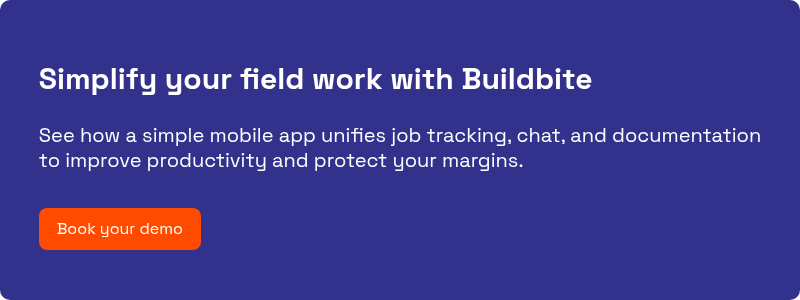
.webp)

